Plastic Strapping Applications
Plastic Strapping Applications.
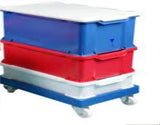
Alternatively a rather more expensive but not necessarily much quicker would be semi automatic strapping machine. The operator can position the trolley for each strapping position and start the strapping cycle via the cycle start button, as shown above. Note however that the determinate governing speed of this system will be the rate at which trolleys are manually placed into the strapping machine.
Strapping Chipboard
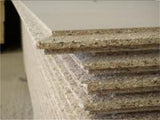
Chipboard and fibreboard (MDF, HDF) are inherently stable and provided they are protected from the weather whilst transported and stored, require the minimum of packaging. The packaging methods however can vary because of the wide variance in product type and size produced. It can be in raw form i.e. with untreated surfaces's ,laminated or coated. Particle board and fibreboard in standard sizes is stacked about 900mm high but can of course be cut to size to suit customer requirements. Polyester strapping, used in conjunction with corner protection pieces to protect the strap from any very sharp edges as these can act on the strap like oscillating blades during transit.
Strapping Pallet boxes
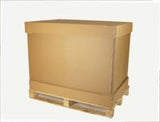
All types of product across all industry sectors require their products to be packaged and transported to all corners of the world and much of this traffic used Triwall cardboard containers. The packaging should be consistent in order for it to be easily stacked and ensure protection against damage from impact and external influences, previously requiring the use of wooden boxes and crates.
With the worldwide use of sea containers there is an ever increasing pressure to ensure that container capacity is fully utilized, whilst goods are able to arrive safely as per ex works despatch conditions on arrival. Plastic Strapping therefore is in widespread use for securing these Triwall containers to pallets, particularly polyester strapping which is unaffected by extreme changes in ambient temperatures. Where this type of packaging is used in high volumes then automatic plastic strapping machines can be used.
Strapping Cans

This type of operation is normally accomplished with the use of automated in line plastic strapping machines due to the very high throughput, the pre-strapped unstability of the load, it's height, and its modular composition - more than 1000 cans. Polyester strapping is always used for this application - 9mm wide - as this can easily be stretched sufficiently to provide good recovery characteristics in the event that the loads are further compressed as happens when the loads are stacked - one on top of the other in distribution areas.
Plastic sheets normally separate each of the layers, and a top board placed on top to ensure even load compression, and to act as top edge protection when the strap is tightened.
Strapping Paper
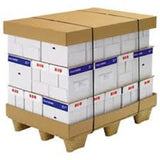
Wrapping and strapping of sheets of paper
Paper size A4 is boxed in five ream quantities per box, secured with 5mm wide polypropylene strapping - palletised, stretch or shrink wrapped and strapped. The average pallet weight is 700 kg, the maximum weight is about 1200 kg.Paper is one of the few products that justify the use of film wrapping to maintain a balanced amount of moisture in the paper and to protect it from dirt and dust., and the best way to apply it is with a semi automatic or automatic stretch film machine. The manual application of films to pallets is costly and there is now also a wide acceptance that risk levels to operators are high and to be avoided.
Palletised paper is generally strapped using an in line plastic strapping machine incorporating a top press to remove air trapped between layers before polyester strapping is applied
Strapping Plastic Tube & Pipes
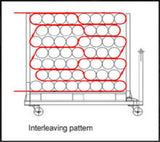
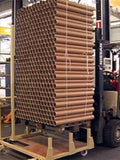 For the smaller plastic manufacturer there is an easy way to strap tubes onto a pallet using only polyester strapping i.e no timber battens, using a simple strap interleaving method and battery powered strapping tools. The strapping is threaded around the tubes prior to applying tensioning and sealing as shown in the diagram to produce a stable pack that can be safely handled and transported.
For the smaller plastic manufacturer there is an easy way to strap tubes onto a pallet using only polyester strapping i.e no timber battens, using a simple strap interleaving method and battery powered strapping tools. The strapping is threaded around the tubes prior to applying tensioning and sealing as shown in the diagram to produce a stable pack that can be safely handled and transported.Strapping Automotive Wheels
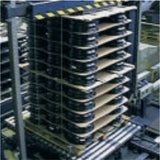
The pallets used are to special sizes to suit the wheels, can be made from timber or metal and are generally held in a recirculating pool.
Pallets of wheels are usually cross strapped with 3 x 2 or 2 x 2 polyester straps. .
Strapping Lead Ingots
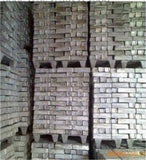
Strapping Metal Billets
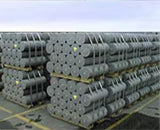 Historically metal billets have been strapped with steel strapping but here's another instance where polyester strapping does a better job, normally applied with pneumatic friction weld strapping tools that can apply the high tensions required to elongate 19mm and 25mm wide strapping. A billet is a length of metal that has a round or square cross-section that are manufactured via a continous casting, extrusion or rolling.
Historically metal billets have been strapped with steel strapping but here's another instance where polyester strapping does a better job, normally applied with pneumatic friction weld strapping tools that can apply the high tensions required to elongate 19mm and 25mm wide strapping. A billet is a length of metal that has a round or square cross-section that are manufactured via a continous casting, extrusion or rolling.Strapping Cardboard
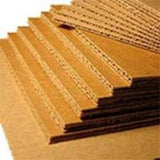
To ensure the most stable and compact load neccesary to allow loads to be stacked safely, and to minimise transport costs the load is compressed with 30 - 50 Kn compressive load, before the straps are applied. Compression is achieved either with a stand alone compression press, or an inline strapping machine incorporating a compression strapping head/platen.
Strapping Plasterboard
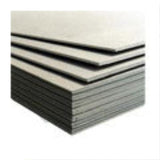
The individual sheets of plasterboard weigh about 20 to 32 kg varying with thickness, 6, 8 or 10mm
The plasterboard sheets are packed on pallets weighing approx 256 kg secured with polyester strapping applied with battery powered hand tools or automated strapping machines that can also apply corner protection.
Strapping Paving Slabs
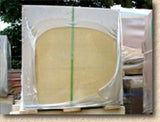
Straps can be placed horizontally and vertically. The position and number of straps depends on size of slab and method pf packaging used. The one common feature that must be observed is the need to make sure that the pack is fully consolidated prior to the strap being applied. Automated Plastic Strapping Machines can incorporate compression devices to ensure this occurs. The use of polyester strapping is well established and is the defacto standard because of its superior tension retension and resistance to UV deterioration.
A polythene top sheet can automatically be placed on top of the load, to prevent water penetration, but allows brand promotion, and a means of printing batch data etc.
Strapping Block Paviours
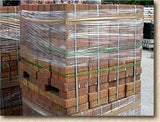
Concrete paviours are not only functional but also decorative. The pallets are subject to vibration during handling and transport and this decorative finish is protected by a separation sheet between the tiles and then securing with polyester strapping generally applied with an automated plastic strapping system. Packs are also shrink wrapped to provide additional weather protection.
